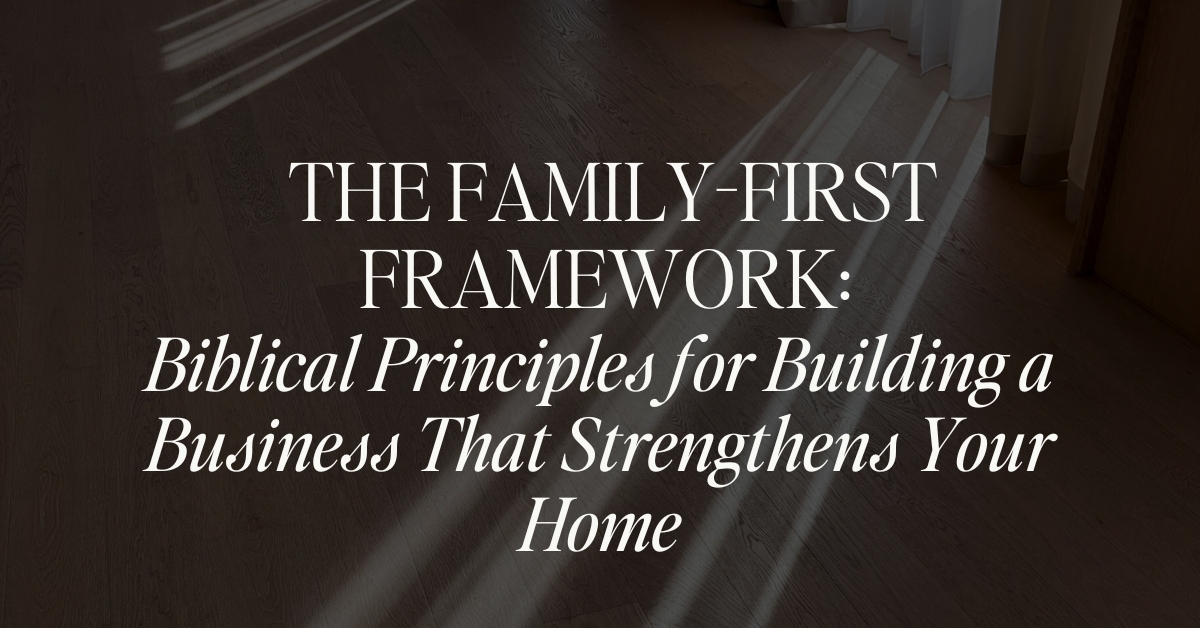Have you ever caught yourself in that painful contradiction? Building a business that was meant to provide for your family while simultaneously feeling like that very business is pulling you away from them?
It’s that moment when you realize you’ve missed bedtime stories three nights in a row because of client work. Or when your child asks, “Are you going to be on your phone the whole time?” during what was supposed to be family time. Or perhaps it’s that subtle distance growing between you and your spouse as your business demands more and more of your attention.
If this resonates, please know you’re not alone. So many women entrepreneurs start businesses with hopes of greater flexibility and family time, only to find themselves caught in a cycle where business growth seems to come at the expense of family connection.
Here’s the truth that transformed my own entrepreneurial journey: The tension between business success and family flourishing isn’t inevitable. It’s not an either/or scenario. With intentional design based on biblical principles, your business can actually strengthen your family rather than strain it.
“Unless the Lord builds the house, those who build it labor in vain.” (Psalm 127:1) This wisdom speaks directly to us as entrepreneurs. When we build our businesses according to God’s design—with family at the center rather than the periphery—we avoid the painful cost of “success” at the expense of what matters most.
What if the business breakthrough you’ve been seeking isn’t about better marketing or another launch strategy? What if it’s about fundamentally realigning your business model around biblical principles that honor your family calling first?

Let’s explore five biblical principles that form the Family-First Framework—a foundation for building a business that strengthens rather than strains your most precious relationships.
1. Honor Divine Order in Your Business Design
“But seek first his kingdom and his righteousness, and all these things will be added to you as well.” – Matthew 6:33
What might a business designed around divine order look like?
- Business hours that honor family rhythms and routines
- Policies that protect sacred family times (mornings, evenings, weekends)
- Service models that allow for predictable, planned work schedules
- Scaling approaches that consider family impact first, not as an afterthought
- Decision-making that filters opportunities through family wellbeing
Consider how your current business structure aligns with divine order:
- Does your business model respect or regularly override family boundaries?
- How do major business decisions account for family impact?
- Are your work hours designed around family needs or vice versa?
- What messages does your current approach send to your family about their priority in your life?
Realigning your business to honor divine order doesn’t mean building a smaller business—it means building a business that’s properly ordered around what God says matters most.
2. Apply the Principle of Sacred Seasons
“For everything there is a season, and a time for every matter under heaven.” – Ecclesiastes 3:1
God’s design includes different seasons, each with its own purpose and rhythm. Yet many business models operate as if every season should look identical, with the same intensity, output, and availability.
The wisdom of Ecclesiastes reminds us that different seasons call for different priorities. There are seasons when business might require more focus and others when family needs must take precedence. The key is recognizing these seasons and designing your business to flex accordingly.

A seasonally-aligned business might include:
- Intentional “family-first” periods during key developmental stages or transitions
- Scaled-back offerings during summer months or school holidays
- Advance planning for business intensity around family capacity
- Different service models or team structures in different life seasons
- Permission to say “not now” to good business opportunities that come in difficult family seasons
To align your business with the principle of sacred seasons:
- Identify your current family season and its unique needs
- Audit how well your business model respects this season
- Consider what adaptations might better honor your current season
- Look ahead to upcoming family seasons and plan business accordingly
- Give yourself grace in the ebb and flow of balancing business and family
Remember: a season-honoring business looks different in different phases of life—and that’s by divine design, not by default.
3. Build from Home-Centered Wisdom
“The wise woman builds her house, but with her own hands the foolish one tears hers down.” – Proverbs 14:1
Scripture presents a striking picture of wisdom as home-building and foolishness as home-destroying. As entrepreneurs, we need to honestly assess: Is my business building up or inadvertently tearing down my home?
This principle challenges us to evaluate our business through the lens of its impact on home life. Beyond just creating financial provision, is your business contributing positively to the atmosphere, relationships, and wellbeing of your home?
A home-strengthening business model might include:
- Business practices that model your values for your children
- Services or products that leverage your strengths without depleting you for family
- Client boundaries that protect your emotional resources for home
- Work that energizes rather than exhausts you before family time
- Business activities that occasionally include family rather than always exclude them
To apply home-centered wisdom to your business:
- Identify aspects of your business that currently strengthen your home
- Recognize elements that might be unintentionally straining your home
- Consider how your business could more actively contribute to family flourishing
- Look for opportunities to model faithful work for your children through your business
- Design rewards and celebrations that include your family in business wins
The question isn’t just whether your business is profitable, but whether it’s contributing to or detracting from the home you’re called to build.
4. Establish Margin as a Biblical Practice
“Six days you shall labor and do all your work, but the seventh day is a Sabbath to the LORD your God. On it you shall not do any work…” – Exodus 20:9-10
Margin—having breathing room between our load and our limits—isn’t just a nice business concept; it’s a biblical mandate. God established the principle of rest and margin from creation itself, demonstrating that boundaries around work aren’t optional but essential to His design.
Yet many business models are built on the assumption of constant availability, maximum capacity, and minimum margin. This approach not only contradicts biblical wisdom but inevitably spills over to harm family life.
A margin-honoring business might include:
- Intentional white space in your schedule between client engagements
- Response time expectations that don’t require constant connectivity
- Pricing that allows you to work at sustainable capacity, not maximum output
- Team support that provides backup during family emergencies or priorities
- Technology boundaries that create true separation between work and home
To implement margin in your business:
- Identify where you’re currently operating with little or no margin
- Consider what a “margin minimum” might look like in your business model
- Design client processes that build in buffer room rather than tight timelines
- Create backup plans for family emergencies or priorities
- Establish clear start and end times to your work day
Remember: margin isn’t inefficiency—it’s the space that allows you to respond to both business and family with wisdom rather than reaction.
5. Cultivate Business as a Family Ministry
“And whatever you do, whether in word or deed, do it all in the name of the Lord Jesus, giving thanks to God the Father through him.” – Colossians 3:17
When we view business merely as a means to financial provision, we miss the deeper purpose God may have for our entrepreneurial calling. Your business isn’t just separate from your family—it can be an extension of your family ministry and values.
This principle invites us to see business not as competing with family purpose but as potentially contributing to it—becoming an avenue through which your family’s values and ministry find expression.
A family-integrated business approach might include:
- Involving your children in age-appropriate business activities that develop their gifts
- Creating opportunities for your family to serve others through your business
- Building a business culture that reflects and reinforces your family values
- Sharing business milestones and challenges as prayer points with your family
- Finding ways your spouse’s gifting might complement your business (if appropriate)
To cultivate business as family ministry:
- Identify the core values your family seeks to live out
- Consider how your business might express or strengthen these values
- Look for appropriate ways to involve family members in your business
- Create regular touchpoints to share your business journey with your family
- Pray together about business decisions and direction
When business becomes an extension of family ministry rather than its competitor, the alignment brings a sense of shared purpose rather than divided loyalty.
Implementing Your Family-First Framework
Building a business that strengthens rather than strains your family isn’t about implementing a few quick tips—it’s about fundamentally designing (or redesigning) your business model around biblical principles that honor your family calling.
This process begins with honest evaluation of your current business structure:
- Where does your business model currently honor family well?
- Where does it create tension with family priorities?
- What aspects most need realignment with biblical principles?
- Which of the five principles resonates most deeply with your current situation?
From there, consider what intentional change might look like. This doesn’t necessarily mean dramatic business upheaval—often it’s about strategic adjustments that better align your work with your family values and needs.
Remember that transition takes time. Moving from a business that inadvertently strains family to one that intentionally strengthens it doesn’t happen overnight. Give yourself grace in the process while maintaining clear vision of where you’re headed.
Join Our Grace and Growth Challenge

Are you ready to build a business that truly strengthens your family rather than competing with it? Join our Grace and Growth Challenge – practical, implementation-focused experiences that help you weave together faith, family, and business.
This isn’t about adding more to your already-full plate. It’s about integrating what matters most in a way that brings alignment rather than fragmentation to your life and work.
Through the Grace and Growth Challenge, you’ll:
- Implement the Family-First Framework in practical, sustainable ways
- Design business systems that protect rather than erode your family relationships
- Develop decision-making filters that honor divine order in your priorities
- Connect with other women entrepreneurs who share your commitment to family-first business
- Create a concrete plan for a business model that strengthens your home
Click here to join the challenge and take a meaningful step toward building a business that honors your family calling as much as your entrepreneurial calling.
What tensions have you experienced between business growth and family flourishing? Share your thoughts in the comments below—let’s learn from each other’s journeys!

